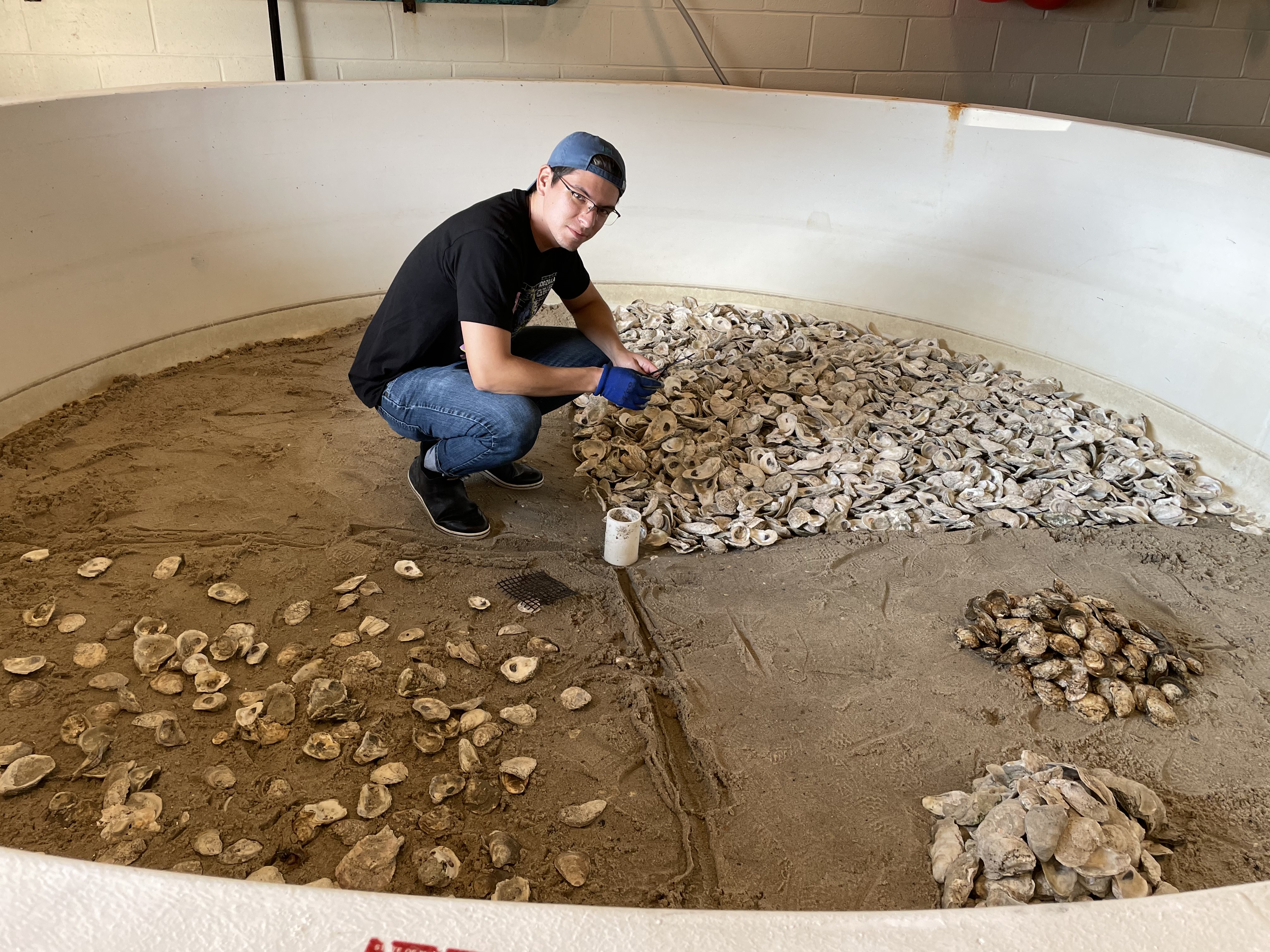
Advisor: Matt Gray, Horn Point Laboratory
What is the focus of your research?
Within the oyster aquaculture industry exist oyster leases, which are plots owned by farmers used to grow and harvest oysters for consumption. My research focuses on measuring how clouds of underwater mud, silt, and clay that form when the sediment is disturbed, called suspended sediment plumes, within oyster leases can be reduced with improvements to oyster aquaculture technology, specifically by replacing dredges with submerged, remote operated vehicles, or ROVs.
How will it make a difference?
The goal of using remote operated vehicles within the oyster aquaculture industry is to improve the efficiency of measuring properties of oyster leases such as oyster growth and water quality, by giving farmers direct visuals of their crops, as well as instantaneous measurements. However, it is important to understand how these new techniques can affect the organisms, including not only the oysters raised for harvest but the ecosystems they create that house algae, crabs, clams, and even fish within the lease when compared to the impact of previous methods. This allows us to determine if our chosen method is not only more efficient, but more beneficial for the environment.
What influenced your career path in science?
I have no shame in the fact that I was inspired to take on a pathway in the sciences because of the media I’ve consumed. I grew up on sci-fi movies, TV shows, and books (including Godzilla!), and a common theme within the genre is the understanding of the beauty of the world around us and just how fragile it really is. I spent a lot of time during my mechanical engineering undergrad thinking about how my projects could be used to better help the environment, and it really came into fruition when I decided to change gears towards studying marine science.
Why did you choose to study with your mentor at UMCES?
I chose to study with my mentor Matt Gray because the project proposed to me blended all my studies very well. I came out of my undergrad with a B.S. in mechanical engineering and a minor in marine science, so when I heard of an assistantship in which the environmental impact of submerged ROVs would be measured I applied as soon as I could. Matt has more of a background with marine science, but he was understanding and supportive of my position and transition into more marine science-based projects. Things just clicked, and it also helps that he’s kind of a cool dude.
What is an experience that stands out most to you about your time at UMCES?
Anytime I go out into the field for either my research or someone else’s. A lot of the time when I get out of the lab, I spend time with local oystermen or oyster farmers and witness what they do every day for a living. It really puts my work into perspective and allows me to understand how my research can better fit their needs. I also get to be out on the water and away from my office, which is always nice!
What is the most important thing people can do to help the environment?
Do the best that you can with the lifestyle you want. It is incredibly difficult to be always completely environmentally friendly, but small things here and there can and will help. It is also important to vote for people who are proven to work towards more sustainable living for all parties.
Do you have advice for kids in the next generation who are interested in STEM fields?
There is a job for everyone, and you shouldn’t feel intimidated because what you want to do may be considered “niche”. There are likely other researchers who are asking the same questions as you, but it may take some effort to find them. If you don’t even have a question, that’s okay too! Others are always looking for a helping hand. Ultimately, you just need to work towards where you want to be in life and reach out to people who you believe will help you get there.
Have you received a scholarship, grant, travel award or gift from a donor? What did it allow you to do and why was that important?
My research is funded by the “Transforming Shellfish Farming with Smart Technology and Management Practices for Sustainable Production” grant from the USDA National Institute of Food and Agriculture. This grant has allowed me to study at UMCES, again funding my research and the various technology needed to complete it, so I believe its importance speaks for itself!
When do you anticipate earning your degree?
I am currently a master’s student with the goal of obtaining that the degree by the year 2024. However, I am in the process of transitioning to a Ph.D. instead and may not earn my degree until 2026.
What are your future plans?
My future plans include further exploring combining my knowledge in engineering with my passion for marine science. Whether that be as a researcher or as a professor, only the future knows!
